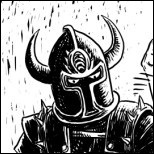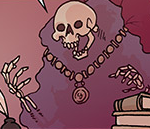|
Cinnamon Bear posted:I was wondering if anyone could recommend a decent bear rpg There's honey heist, a one page rpg about bear crimes.
|
|
|
|

|
| # ? May 13, 2024 22:29 |
|
so, genuine question what's the best RPG for running a setting primarily inspired by Heavy Metal, 2000AD, Berserk, and Manowar album covers I'm thinking Shadow of the Demon Lord, DCC or LotFP e: when I say 2000AD I mean stuff like Slaine and Nemesis the Warlock, not Dredd or Strontium Dog or etc e2: unrelated but I just bumblefucked into running NBA: Dracula Dossier for my 5e group as a side game! WeedlordGoku69 fucked around with this message at 07:51 on Jul 7, 2017 |
|
|
|
Jimbozig posted:So I was just browsing facebook and it turns out the writer of Blood in the Chocolate is a friend of a friend. Normally I'd be inclined to say hi and congrats and network/make friends. But you guys have said real bad things about that adventure. So I could instead opt simply not to introduce myself. In addition to the predatory lesbian, there's some lovely depictions of South American natives, gang-rape by said natives, and gross fetish Magical Realm crap.
|
|
|
|
okay, legit question: how easy is it to transfer NBA to an American setting? it seems like Dracula Dossier in particular is absurdly loving British, and the way I'm planning to run it would likely necessitate me transferring the setting to Texas (I'm doing it as a pseudo-LARP/ARG and I live in Texas; the PCs are internet normies recruited by a rogue Edom agent and sent PDF copies of the Dossier/Dracula Unredacted, and I'm going to be running a 24/7 IC discord for them to discuss their findings with each other and me. if they find something and enough of them can agree that it's a thing, I go into OOC mode and run it as a mini-session). there's a pretty obvious connection in Quincey Morris, but I feel like I'd have to either ditch the 1894 Network entirely otherwise or seriously kludge it for this to work. e: maybe I should be asking this in the GM Advice thread? I dunno
|
|
|
|
With regards to the whole fail-forward / missing-in-combat discussion, I'm a big fan of metacurrency/bennies/action points as a mitigating factor. My view is that the problem with missing in combat is that you don't really have enough control over it: a Fighter is supposed to be "good at fighting" and yet he's completely at the mercy of the dice when he's doing it. Sure, in some gameplay models you can knock it down to "misses only a nat 1" or something similarly rare, but in a lot of other cases you can miss as much as 30%, 40%, even 50% of the time, and that sucks, especially in relation to the issue Kai Tave brought up where you might have an elaborate plan but have no way of guaranteeing it goes off. And that's why I prefer mechanics such as GUMSHOE's point-spends, Red Market's charge-spending, or even D&D 3e's Action Points: you have a limited amount of currency you can use to ensure that your attack/skill-check will hit when you really need it to, but you can't do it all of the time (and the GM should work to try and give the players more dire situations than they have points available to use them on). In my current D&D 3e game, I'm playing a Factotum, whose Inspiration Points let me add my Intelligence modifier to my next skill check, attack roll, or saving throw. It's a powerful ability, to be sure, especially since my Int modifier of +8 means every use of it will turn a failure into a success, but I only have four of them per encounter, so it's very easy to run out.
|
|
|
|
... gently caress me, I just realized what the obvious answer is. Morris offered the rest a safe haven in Texas, far from any likely bloodsuckers, when it was clear that Dracula wasn't as dead as they thought; the Legacies grew up American in Houston as a result. ~naaaailed it~
|
|
|
|
LORD OF BOOTY posted:what's the best RPG for running a setting primarily inspired by Heavy Metal, 2000AD, Berserk, and Manowar album covers
|
|
|
|
Siivola posted:Unless you want to play the supporting cast of Berserk, I'd suggest steering clear of OSR games. I know for a fact LotFP doesn't support any sort of ~epic heroic~ play, it's just plain old-rear end D&D where you die eaten by a grue. maybe not quite that grim, but I would like a full party of 4-6 PCs to roughly equal one Guts in ability if we're using Berserk metaphors specifically e: so basically like the important and cool supporting cast, not the ones that exist to get messily chumped by poo poo
|
|
|
|
Shadow of the Demon Lord has a bunch of rules in I think the Demon Lord Companion that make the heroes a lot more durable and generally badass. If you gotta use a D&D-a-like use that one. My actual answer is octaNe, though.
|
|
|
|
Mr. Maltose posted:Shadow of the Demon Lord has a bunch of rules in I think the Demon Lord Companion that make the heroes a lot more durable and generally badass. If you gotta use a D&D-a-like use that one. I'll second SotDL. I've now run several one-shots and tested out some alternate rules. Endurance (healing surges) + Fortune Points really gives the game a 4E feeling and I think I'll make those standard when I run a campaign. Also, if you miss with an attack you should deal some small amount of damage, like your level or modifier or whatever (for D&D-alikes) because gently caress we have got to get through this combat.
|
|
|
|
Tuxedo Catfish posted:One of the few advantages of random outcomes in combat is that it promotes the need to have contingency plans Kai Tave posted:"you might as well have skipped your turn and browsed Twitter on your phone" is an incredibly dull outcome If you're the guy that missed though you usually don't get to react to a miss that occurred on your turn, and in a "standard" initiative system by the time you get to make another decision the direct effects of your turn have been subsumed by an entire round of additional decision spaces being resolved by other players. Your previous decisions have been invalidated and you gain nothing in return. This isn't a problem in x-com because you're all the players, and in something real-time you can react to your own misses straight away, but a co-operative turn based scenario is harder. What's fun for the team isn't always fun for the player and vice versa, and any solution that doesn't account for both is bad. "Pick your attack and roll... whoops you missed, next player" is bad because it's the worst possible option for individual players, but a good alternative needs to solve this while leaving "Important thing failed to happen!" on the table or replaced by something with similar "Oh gently caress scramble scramble scramble" potential for the team.
|
|
|
|
Thing is, the while "preplanned or improvised" thing might be transparent IC, but it surely isn't OOC. One of my biggest problems with Shadowrun is the enormously complicated stat sets for NPCs compared to the default city setting where the PCs could meet anyone. No one can make up a full stat block for everyone, but if you are going to handwave the stats, it makes all that complexity irrelevant. One reason I like Strike! is that the system design acknowledges this. There _is_ value and relevance in knowing you're exploring an existing world that is defined. It's the difference between Knytt Underground and No Man's Sky. As for "I should get a roll to know these directions are BS", well, that's another issue where skill granularity can become critical. A failed Streetwise check under fail forward could reasonably get you fighting a gang, but a failed Ask Question check.
|
|
|
|
LORD OF BOOTY posted:so, genuine question DCC is perfect for this. After level 0 DCC characters are heroic and with MCC out you can run some of the more sci Fi characters from 2000AD too
|
|
|
|
hyphz posted:There _is_ value and relevance in knowing you're exploring an existing world that is defined. How far ahead of time does it need to be made before it's "an existing world"? Before you start playing at all? Before you start a given session? Just in time for you to experience it?
|
|
|
|
AlphaDog posted:How far ahead of time does it need to be made before it's "an existing world"? Before you start playing at all? Before you start a given session? Just in time for you to experience it? It has to be made independently of my PCs actions and contain predefined responses to them that are coherent. That does not mean that my PCs actions can't change it or that improv will never be necessary. Only that those they _are_ changing it from something that existed. You can't change the world if there is nothing to change it from. Most GMs, including myself, can't define a world independently of their PCs actions when they know what they are.
|
|
|
|
LORD OF BOOTY posted:so, genuine question You could probably do a pretty metal game of Godbound if everyone picked appropriate themes for their characters.
|
|
|
|
Jimbozig posted:
|
|
|
|
Kai Tave posted:Like I continue to play in a regular ongoing 4E campaign and probably the single lamest thing that can happen in any given round is puzzling together the right combination of abilities and movement to pull off some sick combo and then welp I rolled a 3, never mind I guess actually nothing happens, next player. I'm sure that a bunch of people out there would roll their eyes if I told them this and say something about "entitlement" or something but "you might as well have skipped your turn and browsed Twitter on your phone" is an incredibly dull outcome even if you want to try and split the hair that your complete failure to accomplish anything nonetheless actually made something happen because nothing is something or whatever. It also creates a situation where the ability to leverage your limited resources and set up combos and using good tactics is always, always secondary to doing everything you can to avoid missing, and it means that more of a premium is placed on the ability to stack as many +to-hit bonuses as possible than anything else that one might consider a part of "player skill" in the context of tactical combat elfgames. Well dude in tactical combat videogames like Fire Emblem I place my archers to shoot those loving Pegasus Knights for their combo damage bonus and they still manage to loving miss in a 80 to 90% hit chance so 4E definitelt catches that feel.
|
|
|
|
hyphz posted:It has to be made independently of my PCs actions and contain predefined responses to them that are coherent. How do the players know what the PCs are interacting with looked like before they experience it? Let's say the PCs are trying to find a camp from which "short humanoids" have been raiding the village. My notes, written after the previous session, say it's goblins, but as they find the camp, I realise that it's gonna be way cooler if it's kobolds*. Just before I start describing the camp, I make the switch. Now it has always been kobolds. After the session, I update my notes so that any references to "goblin camp" now say "kobold camp". What have the players lost? * E: Maybe because I've just had a better idea about who the big boss is going to be. Maybe the players were discussing what might be coming up and someone said "I hope it's not goblins again, they're boring" and everyone else agreed. Maybe I just realised that I always use goblins and I should switch it up for once. Elector_Nerdlingen fucked around with this message at 13:00 on Jul 7, 2017 |
|
|
|
AlphaDog posted:How do the players know what the PCs are interacting with looked like before they experience it? That's ok. It's still independent and potentially coherent. The problem is not necessarily with improv but with too much of it. What's a problem is if you changed from goblins to (let's presume, tougher) kobolds because nobody asked the right question when asking the villagers what they saw. Likewise "if the players fail to pick the lock then the orcs rush down from their guardroom" is ok. "If the players fail to pick the lock then orcs appear and the next unexplored area the players enter has an orc guardroom" isn't.
|
|
|
|
hyphz posted:What's a problem is if you changed from goblins to (let's presume, tougher) kobolds because nobody asked the right question when asking the villagers what they saw. Why can I not change an encounter based on the player's actions? Why does it matter? How is it different from changing it for any other reason? hyphz posted:Likewise "if the players fail to pick the lock then the orcs rush down from their guardroom" is ok. "If the players fail to pick the lock then orcs appear and the next unexplored area the players enter has an orc guardroom" isn't. Ok, what, specifically, is the difference between this and the goblin/kobold camp? It's an area they haven't seen, it could have anything in it, they have no way of knowing what's there until they get there, it doesn't exist for them yet. What if I just decide that it would be cooler and more fun if there was a guardroom instead of an empty corridor? What if they're steamrolling everything I wrote down so I sub orcs for goblins in the next unexplored room? Or add more goblins to the next unencountered group? Or add a whole new encounter? Or what if I realise I hosed up and everything's way harder than I intended so I remove some bad guys from an upcoming fight? Is it different if it's too hard more because of bad luck rather than bad planning? What if everything's dragging on forever and the players are getting bored so I delete a room and the fight that was in it in the interests of getting to the part they're interested in before everyone has to go home? What if it's only taking forever because they've been searching every wall for secret doors that don't exist so I decide to put one in for them to find and bypass a room for the same exact reason? e: In short, what do the players lose when an area or encounter that they have yet to experience changes, and how would they ever know unless I told them? Elector_Nerdlingen fucked around with this message at 13:19 on Jul 7, 2017 |
|
|
|
Because of the message the players get. The last case is especially bad because it tells players "an easy way to progress is to be bored". Heck, I've seen some adventures that say the GM should keep an area running for as long as the players are interested. So being bored is the ONLY way to progress.
|
|
|
|
hyphz posted:Because of the message the players get. The last case is especially bad because it tells players "an easy way to progress is to be bored". The gently caress? Are you telling them at the start "this is room 1 of 8" or "there are absolutely no secret doors in this dungeon" or something? Short of keeping notes and then going through yours in case you weren't sticking to them, how would they ever know? e: Are you actually saying that you wouldn't extend an area that the players are particularly enjoying? e2: Wait, it sounds like you're saying that if you noticed your players weren't having fun, you'd make no changes and keep going regardless. I'm misreading you, right? Elector_Nerdlingen fucked around with this message at 13:39 on Jul 7, 2017 |
|
|
|
If all the players had the same opinion.. and it was easy to tell that.. and the extension could be bailed out any time since they could stop enjoying it at any moment or in response to an OOC event like a new session... and story progress and pacing weren't just as important as an enjoyable IC environment.. then I can see that logic. But it practice it will never be that cut and dried. I have never met a GM whose improv/notes split couldn't be detected easily. I don't deny that they might exist, but I'm certainly not one.
|
|
|
|
that's my secret, cap. i'm always improv-ing
|
|
|
|
The main tricks that work for me for when my PCs go off my rough plans * double down on the specificness. It is trivial to tell that a 20x20 room is been pulled out of my butt - if it's octagonal but someone has nailed boards over the west and south arches, it's fine. Random charts and tools and lists are great for this * add empty space - it doesnt have to take up a lot of table time but unused space or corridors that you skim over quickly helps a lot. * have a stash of other adventures and unused encounters or weird places. When running 4e having all those dungeon mag PDFs from insider on your laptop was great for this.
|
|
|
|
Like I think doing a convincing illusion that your improv as all preplanned is pretty good for the game - I forgot to mention stealstealsteal. I ran a 6 hr 4e improv session when my PCs went off the map early on ( that module where you gotta hurry and save the drow really didn't encourage my pcs to focus) entirely based off hazy Zorkian underground empire stuff with flood control dams and one of my players went afterwards 'wait, all that was in the module??'
|
|
|
|
hyphz posted:Because of the message the players get. The last case is especially bad because it tells players "an easy way to progress is to be bored". I think there's a lot you're overlooking. First: the players don't get a message. If you're a good improvisatory GM, there should be functionally very little difference between pre-planned failure consequences and on-the-spot failure consequences. If your players feel like things are coming out of nowhere or happening at random, that isn't a problem with the concept of failing forward--it's a problem with the GM. Second: failing forward is just another way of saying that you shouldn't have the players roll for something if there are no interesting consequences for failure. You know that old concept of "taking 20" on a roll, where if there's nothing really pressing or no interesting failure consequence, the character can just take their time and succeed? By extension, that means that if the players are rolling for something, that means there's an interesting consequence if they fail. And that is exactly what "fail forward" means--if a player fails a roll, something interesting happens anyway. That's it. Period. Yeah, that turns into nonsense if you have players rolling all the time for low-stakes things or just for the hell of it. In that context, yeah, you're right, a player rolling could conceivably make the session worse for everyone else. But you shouldn't be doing that, and that's not just storygames talking--it's just good GM advice that I'm pretty sure even D&D incorporates these days. If players only need to roll when there's actually an interesting consequence for failure, suddenly "fail forward" basically happens all on its own. After that, I guess the only real difference is whether you think the GM absolutely must have planned out all of those possible consequences before the session, or whether the GM should derive those consequences from the character's action, the environment, and the current in-game situation on the spot. Or, y'know, a mix of the two as the session goes on, which is the most likely situation.
|
|
|
|
See, it's vice versa for me. I find players don't want to roll if there are interesting consequences for failure because it's too risky and they would bear the responsibility to the group. ("May you live with interesting consequences...") Risk free failure gives the scope to experiment and explore.
|
|
|
|
It wasn't so much advice as self-critique, but when Chandler said "When in doubt have a man come through a door with a gun in his hand." that is actually pretty good advice. If the players are running into unknown territory start a fight. That'll give you time to think of what to do next. I've come up with whole dungeons while running a small battle.
|
|
|
|
hyphz posted:See, it's vice versa for me. I find players don't want to roll if there are interesting consequences for failure because it's too risky and they would bear the responsibility to the group. ("May you live with interesting consequences...") Risk free failure gives the scope to experiment and explore. I'm having a really hard time envisioning how that works, I guess. Do they not end up in high-pressure, adventure-y situations very often? Do they only roll when you make them roll and otherwise are just really passive? In my games, the rolls start happening frequently in two situations: when the players have to do something, or when my players could do something and decide to be as cool as possible while doing it. In my current Strike! game, the players were recently on an interstellar cruise ship pursuing a bandit they had a bounty on as he escaped while making them fight some of his hired goons. They could've just run up the stairs after him and arrived late--I wouldn't have made them roll for that--but instead, one character decided to use her Swashbuckling skill to grappling hook her way up the side of the ship to bypass the stairs, while the group's star mage used her Short-range Portals skill to give everyone else a shortcut up the stairs. They were planning to catch the bounty target in a pincer attack, most of them from behind and the swashbuckler blocking the hall ahead of him. That naturally required rolls. Maybe it's because most of my players actually started on Dungeon World, but I find they really want the risk of rolling. They enjoy when things go well, because it means they get to do something cool, and they enjoy when things go poorly, because it means things have gone wrong in an interesting way.
|
|
|
|
hyphz posted:See, it's vice versa for me. I find players don't want to roll if there are interesting consequences for failure because it's too risky
|
|
|
|
It's more to do with experimentation. If we fail to pick the lock, maybe we can break down the door. Maybe we can find the person with the key and bribe, trick or kill them. Maybe there's another route around. All of that ability to experiment collapses if you only get to try one thing. And there is then no reason to try anything other than the safest option.
|
|
|
|
hyphz posted:It's more to do with experimentation. If we fail to pick the lock, maybe we can break down the door. Maybe we can find the person with the key and bribe, trick or kill them. Maybe there's another route around. I don't see how any of this is precluded by failing forward.
|
|
|
|
Serf posted:I don't see how any of this is precluded by failing forward. I think what they're trying to say is that if they only get to try the one thing because the fail-forward result of a failed lock-pick is that the guards come running, the players are going to be that much more averse to trying more/different things.
|
|
|
|
hyphz posted:It's more to do with experimentation. If we fail to pick the lock, maybe we can break down the door. Maybe we can find the person with the key and bribe, trick or kill them. Maybe there's another route around.
|
|
|
|
Serf posted:that's my secret, cap. i'm always improv-ing I've already said my piece on this discussion, I just thought that was a funny quote.
|
|
|
|
hyphz posted:It's more to do with experimentation. If we fail to pick the lock, maybe we can break down the door. Maybe we can find the person with the key and bribe, trick or kill them. Maybe there's another route around. Interesting consequences don't have to be immediate, nor do they always have to be "hard" (to borrow Apocalypse World's "hard" and "soft" move terminology). Maybe if they fail to pick the lock, the sound of the lockpick breaking echoes through the dungeon, and you can hear monsters that were alerted by it--now you're on a time limit. If you're going to break down the door, you better do it fast. And if they fail the roll to break the door, maybe the door does break, but now it made a loud sound on the other side of the door, so they need to scramble to hide or get ready to fight. Or the player who broke down the door hurt his shoulder and has a -1 to Strength until he can rest. Or something like that, something that doesn't result in "nothing happens  ". ".Or you could borrow the concept of "clocks" from Blades in the Dark, a game with some really brilliant takes on rolls, success, and failure. You have a segmented circle out in the open that either counts up to a goal (with each success moving the players closer to that desired outcome) or counts down to a consequence (like guards being alerted, or running out of time before reinforcements appear). That way, an "interesting consequence" from a roll can be delayed and offer the players a chance to improvise their way out of it or try another path, or it can instead hasten some inevitable undesirable outcome, or be a setback that removes some progress on something the players were working on. To paraphrase something I just read while poking through the Strike! book, when every roll is life-or-death, it gets exhausting, and it also gets boring. A failed roll should make something happen, but that something doesn't have to be an immediate hammer coming down. It can instead set something bad in motion (your lockpick breaking alerted guards), remove some resources (you broke your last lockpick, so you won't be picking any more locks until you get more), make it clear that something bad that was already coming is now coming faster or use up the players' time (you were trying to pick the lock quickly because the guards are searching for you, now they're drat near breathing down your neck because of the time you wasted), or a whole bunch of other things. Yeah, if every roll has some sort of immediate "you're hosed now" on the other side of it, that's going to suck for everyone at the table. But consequences shouldn't always be immediate or irreversible.
|
|
|
|
gradenko_2000 posted:I think what they're trying to say is that if they only get to try the one thing because the fail-forward result of a failed lock-pick is that the guards come running, the players are going to be that much more averse to trying more/different things. See the way I would handle it is that you do manage the pick the lock, but the door is creaky as hell and that brings the guards. But that doesn't mean you have to fight, you can then hide or run. Instead of a fight just tick a clock segment that is leading to a fight at some point.
|
|
|
|

|
| # ? May 13, 2024 22:29 |
|
Splicer posted:"You jam the lock/determine the lock is magically sealed or well beyond your available skill and tools, you'll have to try something else" falls under the heading of "fail forward". In this space, I am also a fan of the "one-and-done" statement from Red Markets, in that you can choose who among the party (that is present) gets to make a skill check, but they only ever get to try once, period. In that game, there's a verisimilitude aspect to it in that one-and-done only applies to certain rolls but not others where it would make sense, but I think it would also work as a meta-house-rule to make it generally apply to everything.
|
|
|



























